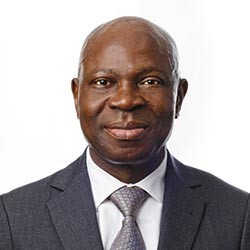Crans Montana Forum - Statement by Gilbert F. Houngbo, President of IFAD
IFAD Asset Request Portlet
Agrégateur de contenus
Crans Montana Forum - Statement by Gilbert F. Houngbo, President of IFAD
The impact of the current international turmoil on food security and the necessity for all countries to work on food sovereignty
24 juin 2022Check against delivery
The war in the Ukraine has once more propelled food security into the spotlight.
The resilience of the world’s most vulnerable people is being pushed to the limit year after year, shock after shock. Drought is threatening a food security crisis in the Horn of Africa.
Climate change, conflict and the pandemic are rolling back decades of development gains and could push millions of people deeper into hunger. The progress we have made towards the Sustainable Development Goals is at risk.
Even before the war in Ukraine, the situation was dire. Between 720 and 811 million people went to bed hungry every night. And now, that number is growing.
At the same time, we face an annual shortfall of around US$300 to $350 billion to transform food systems to deliver healthy people, a healthy planet, and healthy economies. We do need political commitment – underpinned by funding – to create sustainable and resilient food systems and greater food sovereignty.
Building resilient food systems and communities in the face of unpredictability is built into IFAD’s DNA.
Indeed, IFAD was created as a direct response to drought and famine, to address extreme poverty and hunger in the rural areas.
With more than 40 years of experience, we have invested in small-scale producers in the world’s poorest countries to improve human dignity, food security, preserve agro-biodiversity, revitalize rural economies and societies and on food sovereignty.
We work with governments, donors, the private sector, and poor rural people including women, youth, people with disabilities, and indigenous peoples and their organizations, to build coalitions and empower rural communities to lead their own development.
An estimated 80 per cent of the world’s poorest and an equal portion of the hungriest live in the rural areas of developing countries. They are too often excluded from bigger development and financing initiatives. They are, and will always be, IFAD’s core constituency.
In 2021 we reached 130 million of the world’s poorest people to improve income, food and nutrition security and their families’ livelihoods, and transformed 1 dollar contribution into 8 dollar investment through partnership and modern financial architecture.
These are the investments that can end dependence on food imports, and offer real opportunities for young people, women, and the world’s most marginalized.
Food systems should, and can, be an engine of inclusive economic growth– generating income and employment, while at the same time helping to end poverty and hunger and ensuring food sovereignty.
Transforming small-scale farms into sustainable agribusinesses is also key to food sovereignty, and creating jobs along the value chain, particularly in processing, transport, and marketing.
In all these, investment remain critical. Modern storage and processing facilities can reduce post-harvest losses. Technology can make farm work less arduous and more appealing to young people. It can help create decent jobs and ensure the stability of income or food production, even in a context of climate change.
Information and communication technology is also important. Mobile phone services already provide real-time weather information and market data; satellites measure soil moisture; solar panels power irrigation systems. This is how small farms can change, adapt, and succeed.
In response to the fallout from conflict in the Ukraine, IFAD has launched a Crisis Response Initiative. The initiative aims to protect the development gains and livelihoods of poor rural households and producers within our projects, while reinforcing their resilience to this new shock, focusing on the poorest and most affected countries, allowing them to continue growing their own food, while reducing their reliance on imports.
The situation is challenging, but it is far from hopeless. With greater global commitment to sustainable and inclusive food systems, and to greater food sovereignty, there is the promise of new opportunities in rural areas.
For example, as countries move towards greater food sovereignty, they can develop new regional and national markets for local and indigenous foods. Why should countries that already grow cassava and sweet potato rely on importing grain?
And there are many local cereals and neglected or under-utilized crops that hold great potential, such as sorghum.
